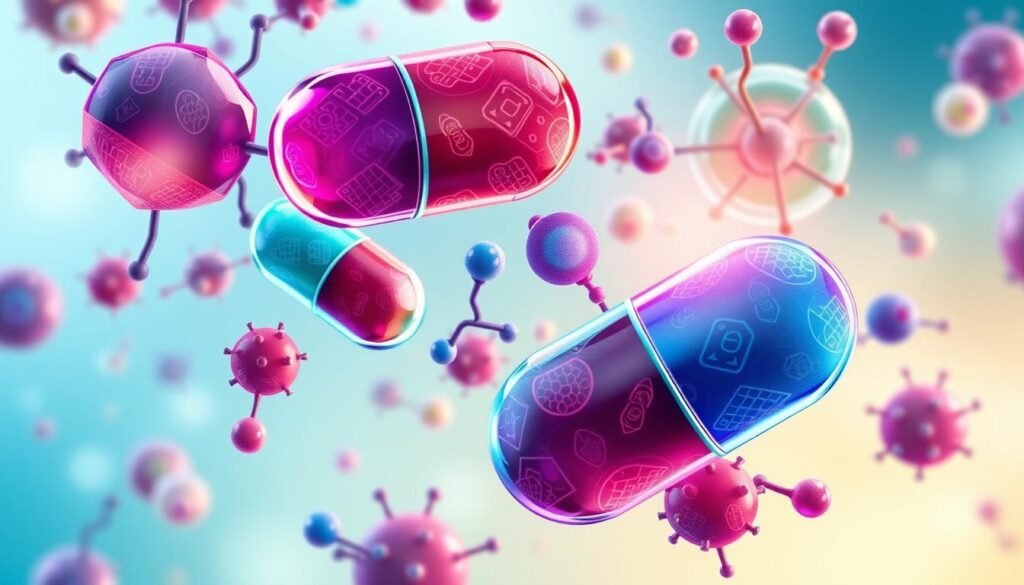What if we could manage cholesterol not by cutting down its production, but by stopping its absorption? Cholesterol absorption inhibitors offer a new way to fight high levels of bad cholesterol, known as LDL. They are crucial for people who can’t lower their cholesterol, despite trying hard with diet and exercise. By zeroing in on how cholesterol is taken in by our guts, cholesterol absorption inhibitors like ezetimibe open a new door for lowering LDL. Ongoing studies keep showing how valuable this method can be for a healthier heart.
Key Takeaways
- Cholesterol absorption inhibitors tackle LDL cholesterol by preventing absorption in the digestive system.
- They provide an alternative for individuals struggling to manage cholesterol levels through traditional methods.
- This innovative approach promises enhanced cardiovascular health and effective cholesterol management.
- Ezetimibe is a commonly used cholesterol absorption inhibitor with proven efficacy.
- Research indicates significant benefits in overall cholesterol treatment when incorporating these inhibitors.
Understanding Cholesterol and Its Types
Cholesterol is key for our body’s health. It’s a waxy, fat-like material found in all cells. It’s needed for making hormones, vitamin D, and digesting fats. Cholesterol travels in our blood, carried by lipoproteins.
What is Cholesterol?
Cholesterol is vital for cell health and making necessary compounds. While our bodies make enough, we also get it from food. Keeping cholesterol levels in check is crucial for our wellbeing.
Types of Cholesterol: HDL vs. LDL
There are two main cholesterol types: HDL and LDL. It’s important to know the difference to manage cholesterol well.
- HDL: Called “good” cholesterol, HDL takes excess cholesterol from the blood. High HDL levels mean a lower heart disease risk.
- LDL: This is “bad” cholesterol. Too much LDL leads to plaque in arteries, raising heart disease risk.
It’s essential to balance HDL and LDL for healthy cholesterol levels and lower health risks.
What Are Cholesterol Absorption Inhibitors?
Cholesterol absorption inhibitors are a unique kind of medicine. They help manage cholesterol by reducing how much we absorb from food. This lowers the cholesterol in our blood.
Definition and Mechanism of Action
These inhibitors stop a protein called NPC1L1, which helps cholesterol get into our body. By blocking it, the liver makes less cholesterol. It also removes the bad kind, known as LDL, from our blood. This makes our overall cholesterol level go down, especially the harmful LDL.
Commonly Used Cholesterol Absorption Inhibitors
Doctors often prescribe a drug called Ezetimibe for lowering cholesterol. Its brand name is Zetia. It can work alone or with other drugs called statins to help our hearts by reducing LDL more.
| Cholesterol Absorption Inhibitor | Brand Name | Common Use |
|---|---|---|
| Ezetimibe | Zetia | Lowering LDL cholesterol levels |
| Combining Ezetimibe with Statins | Vytorin | Enhanced LDL reduction |
The Role of Cholesterol Absorption Inhibitors in Cholesterol Management
Cholesterol absorption inhibitors play a key role in managing cholesterol well. They focus on stopping cholesterol from food from being absorbed. This method is different from how most cholesterol drugs work, which usually reduce how much cholesterol the liver makes. This unique approach can help people who don’t get enough benefit from standard treatments.
How They Differ from Traditional Cholesterol Medications
Most cholesterol drugs, like statins, aim to cut down cholesterol by blocking its creation in the liver. On the other hand, cholesterol absorption inhibitors limit how much cholesterol is taken in by the intestines. This distinction helps doctors create customized treatments that match what each patient needs for their cholesterol management.
Benefits for LDL Reduction
Cholesterol absorption inhibitors are great for lowering LDL, often called “bad” cholesterol. They stop cholesterol from entering the bloodstream, which lowers LDL cholesterol. This helps lower the risk of heart disease. People who use these inhibitors usually see a better cholesterol balance, which boosts heart health.
Integration with Other Cholesterol-Lowering Therapies
Combining cholesterol absorption inhibitors with other treatments can produce better results. Adding them to drugs like statins, or making lifestyle changes, can make a cholesterol plan work better. This lets doctors tailor treatment to what each person needs, depending on how they respond.
How Cholesterol Absorption Blockers Work
Cholesterol absorption blockers help manage cholesterol levels. These medications stop cholesterol from being absorbed in the intestines. By doing this, they help lower cholesterol effectively.
The Science Behind Cholesterol Absorption Inhibition
These blockers work by stopping a protein named NPC1L1. This action decreases how much cholesterol we get from food. With less cholesterol entering our blood, the liver uses what’s already there more efficiently. This helps keep cholesterol levels healthy.
Effectiveness in Lowering Cholesterol Levels
Clinical studies show these inhibitors can lower LDL cholesterol by 20% to 25%. Their ability to reduce cholesterol levels makes them crucial in treatment plans. They are safe and provide a dependable option for controlling high cholesterol.

| Aspect | Cholesterol Absorption Blockers | Traditional Statins |
|---|---|---|
| Mechanism of Action | Inhibits cholesterol absorption in the intestines | Reduces cholesterol production in the liver |
| Effectiveness | 20% to 25% reduction in LDL | 30% to 50% reduction in LDL |
| Common Side Effects | Gastrointestinal discomfort | Muscle pain, liver issues |
| Use with Other Medications | Safe to combine with statins | Can interact with certain medications |
Cholesterol Absorption Inhibitors in Cardiovascular Health
Cholesterol absorption inhibitors are key in boosting heart health by lowering LDL cholesterol. This drop in cholesterol is important for reducing heart disease risk. It’s essential for those keeping an eye on their cholesterol levels.
Knowing how these inhibitors work helps us see their benefits for heart health. They’re especially beneficial for people at risk of heart problems.
Impact on Heart Disease Risk
The link between LDL cholesterol and heart disease is clear. By cutting LDL levels, we can reduce the risk of heart attacks and strokes. People who use these inhibitors often see better heart health measures.
These treatments are great for lowering cholesterol and improving heart health. They help users maintain a healthier heart.
Studies Supporting Their Use
There’s a lot of research backing up the benefits of cholesterol absorption inhibitors. Take the IMPROVE-IT trial, for instance. It shows combining Ezetimibe with statins leads to better heart outcomes.
These findings highlight how well cholesterol inhibitors work, not just for managing cholesterol, but for enhancing heart health. For anyone looking to improve their heart health, cholesterol absorption inhibitors are worth considering.
Pharmaceutical Drugs vs. Natural Alternatives
When it comes to cholesterol, patients have to choose between drugs or natural methods. Each option has its benefits, depending on one’s health and preferences.
Comparison of Effectiveness
Pharmaceuticals, like those stopping cholesterol absorption, work well for genetic high cholesterol cases. On the other hand, diet and certain supplements might help but slowly. Drugs are reliable for quick LDL reduction.
Safety and Side Effects of Cholesterol Absorption Inhibitors
It’s important to consider the side effects of drugs versus natural options. Cholesterol drugs can cause stomach issues and muscle pain, making some people avoid them. Natural methods are usually safer with less risk of adverse effects. Knowing these can help choose the best cholesterol strategy.

| Aspect | Pharmaceutical Drugs | Natural Alternatives |
|---|---|---|
| Effectiveness | High, rapid LDL reduction | Moderate, gradual improvement |
| Safety | Potential side effects (e.g., GI discomfort, muscle pain) | Generally safer, fewer side effects |
| Usage | Prescription-based | Dietary choices and supplements |
| Ideal Candidates | Those with high LDL or familial hypercholesterolemia | Individuals seeking preventive measures |
Cholesterol Treatment Guidelines and Recommendations
Current guidelines for cholesterol focus on personal factors. These include LDL levels, age, and health history. It’s key to look at overall heart risk before picking a treatment path.
Current Guidelines for Use
Top health groups like the American Heart Association recommend treatments just for you. For those who can’t use statins or need more LDL lowering, cholesterol absorption inhibitors are good. They are also vital for people with heart disease or metabolic syndrome.
Who Should Consider Cholesterol Absorption Inhibitors?
Cholesterol absorption inhibitors are fit for certain people. They are for:
- Patients with high LDL levels despite lifestyle changes.
- Those experiencing significant side effects from statin therapy.
- Individuals with a history of cardiovascular events.
- Patients having other risk factors, like metabolic syndrome.
Managing Cholesterol: Lifestyle Changes and Dietary Considerations
It takes more than medicine to manage cholesterol well. You need to change your lifestyle and diet for a healthier heart. Developing good habits is key to getting your cholesterol levels right.
Healthy Eating Practices
Eating right is important for controlling cholesterol. Adding a mix of foods to your diet can help a lot:
- Fruits and Vegetables: They’re full of vitamins and fiber.
- Whole Grains: This includes foods like oats, brown rice, and quinoa.
- Healthy Fats: Choose unsaturated fats in things like avocados, nuts, and olive oil.
- Limit Saturated and Trans Fats: Find these in red meat, full-fat dairy, and fried foods.
Importance of Physical Activity
Being active is key for managing cholesterol well. Some good activities include:
- Walking
- Running
- Swimming
These activities can boost your HDL (“good” cholesterol) and lower LDL (“bad” cholesterol). Exercising regularly not only helps with cholesterol but also improves overall health.
Monitoring Cholesterol Levels
Checking your cholesterol levels regularly is important. It lets you see if your lifestyle and diet changes are working. It helps you:
- Watch cholesterol changes over time
- Make smart health choices
- Change your treatment plan if needed
Knowing how lifestyle changes affect cholesterol levels helps tailor a plan for your heart health.

Cholesterol Absorption Inhibitors: Future Trends in Treatment
Cholesterol management is changing fast, with a focus on cholesterol absorption inhibitors. These new therapies are promising for treating high LDL levels. They aim to make treatment better by increasing how well patients stick to their medicine.
Innovations in Cholesterol-Lowering Therapy
There are new drug types and combination treatments that greatly lower LDL. These improve how well treatments work. They also help more types of patients. Ongoing studies are showing how these inhibitors can help people at high risk of heart disease. You can find more information on this in research studies.
Potential New Research Studies
New studies focus on how genes affect cholesterol absorption. This could lead to treatments designed for each person. This approach looks promising for making treatments safer and more effective. The focus is on treatments that meet future needs as discussed in future trends.
Conclusion
Cholesterol absorption inhibitors offer a unique way to manage cholesterol, especially for lowering LDL. They work well with lifestyle changes and other medications. This leads to better heart health.
Health experts are seeing great results from using these inhibitors. They help develop treatments that offer more benefits. Adding these inhibitors to health plans can greatly improve heart health for those with high cholesterol.
Thanks to new research, healthcare providers can create personalized cholesterol plans. For more information on these treatments, check out this relevant source. This tailored approach helps achieve immediate and long-term health goals.